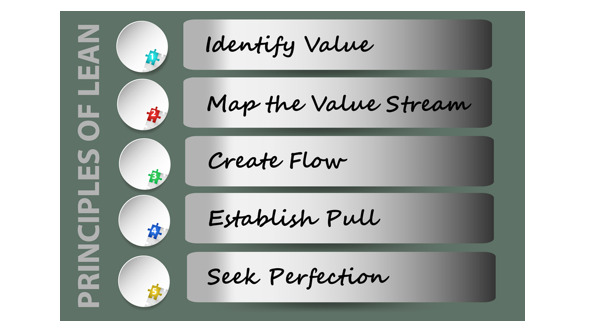
 Data Structure
Data Structure Networking
Networking RDBMS
RDBMS Operating System
Operating System Java
Java MS Excel
MS Excel iOS
iOS HTML
HTML CSS
CSS Android
Android Python
Python C Programming
C Programming C++
C++ C#
C# MongoDB
MongoDB MySQL
MySQL Javascript
Javascript PHP
PHP
- Selected Reading
- UPSC IAS Exams Notes
- Developer's Best Practices
- Questions and Answers
- Effective Resume Writing
- HR Interview Questions
- Computer Glossary
- Who is Who
What are the Lean Principles in Quality Management?
Introduction
Lean manufacturing and lean management are the process?oriented approaches emphasizing waste reduction. Consider a business organization looking to improve its business processes and wants to remove all activities that do not add value to the company. In such a scenario, you must thoroughly audit the company's business activities, evaluate the workflow, and identify the resource allocations to check for any wastage in the business processes. Herein you can use lean principles, and you will find that you can implement them effectively even in quality management.
Some of the factors to consider when you are implementing lean principles in quality management are as listed here.
What are the Lean Principles?
To use lean principles in quality management, you must first understand the principles and their objective.

Lean principles, especially in the case of management, are based on the following five factors:
Identification of value
Create a value stream map
Develop a continuous workflow
Create a pull system
Create room for constant improvement
Once you understand the lean principles, you must evaluate whether these can be successfully implemented in improving business processes and reducing expenditure.
You can effectively use lean principles in the case of management, as they are responsible for improving a company's overall productivity. If you think about it, quality management depends on improving the workforce's efficiency.
Depending on the strengths of the resource, resource allocation is made. If you are unable to evaluate the strength of the resource you cannot identify whether it is correct for the project. This can affect the quality of the deliverable and result in wastage.
The productivity of the resources needs to be evaluated properly in order to ensure there is reduced wastage, and excellent quality of the product is also achieved. In this way, lean principles come into play ? to ensure that resource allocation is done correctly and that the quality of the deliverable is not compromised at any stage.
Example of Implementation of Lean Principles in Quality Management
Creating a quality management system around these five lean principles can reduce the overall business operational expenses. For example, you have a deliverable which needs to be done at a certain timeline. You have the scope and the proposal ready. When it comes to quality management, identifying the product's value is essential. Your client is paying for the value addition, and quality management is critical to ensure that the quality of the product is not compromised at any stage.
If required, you must adhere to the timeline for the next development stage to ensure continuous workflow. Ensure that each activity adds value to the business process, essential for quality management. You can implement the first Lean principles in quality management to ensure that the process of creating and delivering a quality product to customers remains uninhibited. By implementing lean principles, you can reduce wastage in resource allocation and ensure that the final product offered is as per client requirements. This is essential to eliminate wastage and improve the quality of the deliverable.
Can Lean Principles Be Used to Streamline Business Processes and Improve Production Quality?
Quality management does not mean ensuring the final product is defect free. As a business manager, you must consider doing quality management at each production stage. This streamlines the business processes and prevents bottlenecks from occurring when working with multiple teams.
When you think of a pull system, you will find that lean principles can help create an environment without production waste.
Quality management is essential to ensure that the deliverable you are manufacturing utilizes a specific system so that resources are not wasted. Here, you need to apply the lean principles to improve the quality of each deliverable. This reduces the cost because the rework increases if a defect appears at the later stages of production.
Moreover, this can delay the entire process and even lead to deliverables that could be of better quality. Hence, implementing lean principles in quality management can help you improve the quality of the product at each phase of production by ensuring a continuous workflow,
Lean Principles Reduce Resource Wastage and Improve Quality of Products
Resource wastage will impact the quality of the product, and the final product can also get compromised. When working within the premise of lean principles, you must reduce cost and eliminate wastage. Resource allocation must be done based on productivity and efficiency. You must allocate the resources to the business activities correctly to ensure that you will maintain the productivity and quality of the business process. Hence, evaluating whether the resource is suitable for the business activity is best before you allocate it. This is, too, essential for quality management.
Can Lean Principles Help with the Improvement of Business Processes?
When you have room for improvement, quality management becomes more straightforward. You can keep identifying better methods of streamlining the business processes and ensuring that quality management is done at every stage of development. This will ensure that the final product is defect free and your client will be satisfied with the deliverable. Thus, using lean principles in quality management, you can successfully reduce expenditure by identifying any wastage and, at the same time, ensuring that the final product is as per the client's requirements.
This reduces the chances of rework and ensures that it continuously improves the quality of your business activities. Lean management can help improve the evaluation capacity of your managerial team, and you will find that they can guide the workforce better to produce quality work and improve your company's overall efficiency.
Conclusion
As mentioned earlier, lean principles and lean management are essential if you want to reduce costs, eliminate resource wastage, and improve the overall quality of your company's deliverables. The principles can create a cohesive work environment to help the resources work together efficiently. This can improve your firm's productivity and the quality of your company's products and services.

